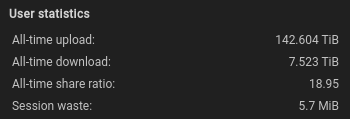- 0 Posts
- 34 Comments
Duck typing moment

 12·2 months ago
12·2 months agoYou’re not wrong, but it bugs me when my ratio drops, so I always seed everything I download. I have a pretty good internet service though.
My stats:


 1·2 months ago
1·2 months agoI think odin could be a good fit. I haven’t used it myself. It seems to focus on 3D and game dev.
Linux uses 8 spaces. Excerpt from the official style guide:
Tabs are 8 characters, and thus indentations are also 8 characters. There are heretic movements that try to make indentations 4 (or even 2!) characters deep, and that is akin to trying to define the value of PI to be 3.
Rationale: The whole idea behind indentation is to clearly define where a block of control starts and ends. Especially when you’ve been looking at your screen for 20 straight hours, you’ll find it a lot easier to see how the indentation works if you have large indentations.
Now, some people will claim that having 8-character indentations makes the code move too far to the right, and makes it hard to read on a 80-character terminal screen. The answer to that is that if you need more than 3 levels of indentation, you’re screwed anyway, and should fix your program.
In short, 8-char indents make things easier to read, and have the added benefit of warning you when you’re nesting your functions too deep. Heed that warning.
The reasoning seems sound, but I still prefer 4 personally.
I used vscode for a few years, but I eventually went back to neovim/tmux. It’s a lot less resource heavy, and it’s easy to just ssh and jump in from home. I also much prefer a modal editor and I don’t want to have to touch a mouse.

 1·4 months ago
1·4 months agoWhat makes Servo a better bet than Ladybird? Who backs it?

 14·4 months ago
14·4 months agoSince people keep bringing up tauri, here’s the comparison made in the README:
Dioxus vs Tauri
Tauri is a framework for building desktop (and soon, mobile) apps where your frontend is written in a web-based framework like React, Vue, Svelte, etc. Whenever you need to do native work, you can write Rust functions and call them from your frontend.
-
Natively Rust: Tauri’s architecture limits your UI to either JavaScript or WebAssembly. With Dioxus, your Rust code is running natively on the user’s machine, letting you do things like spawning threads, accessing the filesystem, without any IPC bridge. This drastically simplifies your app’s architecture and makes it easier to build. You can build a Tauri app with Dioxus-Web as a frontend if you’d like.
-
Different scopes: Tauri needs to support JavaScript and its complex build tooling, limiting the scope of what you can do with it. Since Dioxus is exclusively focused on Rust, we’re able to provide extra utilities like Server Functions, advanced bundling, and a native renderer.
-
Shared DNA: While Tauri and Dioxus are separate projects, they do share libraries like Tao and Wry: windowing and webview libraries maintained by the Tauri team.
-

 1·5 months ago
1·5 months agodeleted by creator

 2·6 months ago
2·6 months agoC is a pretty simple language and relatively easy to learn. But it’s a lot harder to be proficient with.

 1·7 months ago
1·7 months agoCan’t they just use JSDoc?
By the same argument, wouldn’t GPL and other copyleft licenses be considered non-free as well since you are not free to do whatever you want with the source? For example, incorporating it into a proprietary project, refusing to provide the source to users upon request, or not disclosing attribution, etc. The latter would even go against the terms of permissive licenses.
Clearly defining what free, and by extension FOSS, means is very relevant.

 1·8 months ago
1·8 months agoIt seems that no lua is packaged with pandoc-cli (By looking at the package contents of https://archlinux.org/packages/extra/x86_64/pandoc-cli/)
So if I were you I would first try the AUR and see if there’s any package there that does.

 12·8 months ago
12·8 months agoIt’s when you open a publicly facing port and map (forward) it to a local port your machine. In this case, it’s opened at the vpn provider’s public gateway. Otherwise, it would typically be opened in your router instead.
You can then configure your torrent client to listen on that local port that the public port is forwarded to. I think generally the public and the local port are the same number when using VPN.
If you do that, then others have the ability to initiate a connection to you instead of only you being able to initiate the connection to somebody else.
When seeding/leeching to/from someone else, at least one of you needs a port open. So, if you always have one open, you allow yourself to connect to anyone on the network regardless if they have one open or not.
Sorry if I confused you more, I’m not that great at explaining.

 10·9 months ago
10·9 months agoI seed without cap, don’t really need my upload for anything else. (500 Mbps)
What’s the distro? I can help seed it indefinitely with open ports.

 1·9 months ago
1·9 months agoYeah I don’t want to be a nuisance to my office neighbours. Right now I’m using a logitech mx keys, I could try looking for an ansi version of that.
I will probably order a keychron with low profile switches for my home setup, so I depending on how quiet it is I might get that for work as well.

 11·9 months ago
11·9 months agoHuh? Yes it does. Unless you mean it’s not cracked yet.
So you have never iterated over command line arguments and tried to identify options? Or taken a string input field?


Codeberg looks pretty good at a quick glance.